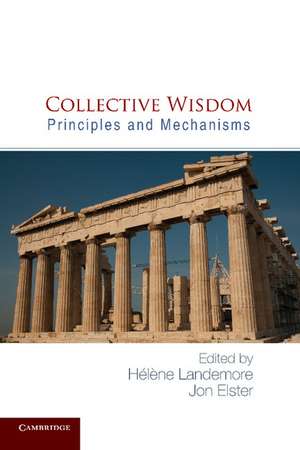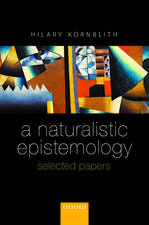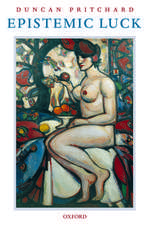Collective Wisdom: Principles and Mechanisms
Editat de Hélène Landemore, Jon Elsteren Limba Engleză Paperback – 30 apr 2014
Preț: 327.12 lei
Nou
Puncte Express: 491
Preț estimativ în valută:
62.59€ • 65.53$ • 51.79£
62.59€ • 65.53$ • 51.79£
Carte tipărită la comandă
Livrare economică 08-22 aprilie
Preluare comenzi: 021 569.72.76
Specificații
ISBN-13: 9781107630277
ISBN-10: 1107630274
Pagini: 420
Ilustrații: 17 b/w illus. 8 tables
Dimensiuni: 156 x 234 x 24 mm
Greutate: 0.64 kg
Editura: Cambridge University Press
Colecția Cambridge University Press
Locul publicării:New York, United States
ISBN-10: 1107630274
Pagini: 420
Ilustrații: 17 b/w illus. 8 tables
Dimensiuni: 156 x 234 x 24 mm
Greutate: 0.64 kg
Editura: Cambridge University Press
Colecția Cambridge University Press
Locul publicării:New York, United States
Cuprins
1. Collective wisdom: old and new Hélène Landemore; 2. Prediction markets: trading uncertainty for collective wisdom Emile Servan-Schreiber; 3. Designing wisdom through the web: the passion of ranking Gloria Origgi; 4. Some microfoundations of collective wisdom Scott Page and Lu Hong; 5. What has collective wisdom to do with wisdom? Daniel Andler; 6. Legislation, planning, and deliberation John Ferejohn; 7. Epistemic democracy in classical Athens: sophistication, diversity, and innovation Josiah Ober; 8. The optimal design of a constituent assembly Jon Elster; 9. Sanior pars and major pars in the contemporary aeropagus: medicine evaluation committees in France and the United States Philippe Urfalino; 10. Collective wisdom: lessons from the theory of judgment aggregation Christian List; 11. Democracy counts: should rulers be numerous? David Estlund; 12. Democratic reason: the mechanisms of collective intelligence in politics Hélène Landemore; 13. Rational ignorance and beyond Gerry Mackie; 14. The myth of the rational voter and political theory Bryan Caplan; 15. Collective wisdom and institutional design Adrian Vermeule; 16. Reasoning as a social competence Dan Sperber and Hugo Mercier; 17. Conclusion Jon Elster.
Recenzii
“In bringing together essays by students of politics, economics, philosophy, history, and cognitive science – disciplines that have much to say to each other but engage in joint conversation too rarely – Landemore and Elster make a significant contribution. Many of the individual articles are by scholars working at the frontiers of their respective fields. No work on collective intelligence has covered the subject with such breadth, scope, or wisdom.” – Robert Laubacher, Center for Collective Intelligence, MIT Sloan School of Management
“This cutting-edge collection shows that in the last decade human beings have attained a genuinely new understanding of how and why collective wisdom can surpass that of any individual. Each essay adds subtlety, theoretical insight, or a telling example. Together they build to a compelling conclusion: societies succeed when they organize themselves to think better collectively. They can do this consciously through institutions whose principles and mechanisms are laid out in this book.” – Jane Mansbridge, Adams Professor, Kennedy School of Government, Harvard University
“For more than two decades, the ideas of participatory democracy and later on of deliberative democracy have stimulated the debate on the various forms of democratic development. Collective Wisdom opens a new cycle with the notion of epistemic democracy, renewing the very meaning of universal suffrage. This pathbreaking book brings together a series of contributions that define a promising field of research.” – Pierre Rosanvallon, Chair in Modern and Contemporary History of Politics, Collège de France
“Can crowds be anything but unwise? Is there any reason to suppose that collective judgments could be accurate? The papers gathered in this volume suggest some stimulating ways to claim that those questions could be answered affirmatively and that the so called ‘mob’ might sometimes be less foolish and less unreliable than it has commonly been taken to be. Very rewarding in times when democracy is so frequently deemed unable to cope with complex questions.” – Jean-Fabien Spitz, Professor of Political Philosophy, University of Paris I Panthéon Sorbonne
“This cutting-edge collection shows that in the last decade human beings have attained a genuinely new understanding of how and why collective wisdom can surpass that of any individual. Each essay adds subtlety, theoretical insight, or a telling example. Together they build to a compelling conclusion: societies succeed when they organize themselves to think better collectively. They can do this consciously through institutions whose principles and mechanisms are laid out in this book.” – Jane Mansbridge, Adams Professor, Kennedy School of Government, Harvard University
“For more than two decades, the ideas of participatory democracy and later on of deliberative democracy have stimulated the debate on the various forms of democratic development. Collective Wisdom opens a new cycle with the notion of epistemic democracy, renewing the very meaning of universal suffrage. This pathbreaking book brings together a series of contributions that define a promising field of research.” – Pierre Rosanvallon, Chair in Modern and Contemporary History of Politics, Collège de France
“Can crowds be anything but unwise? Is there any reason to suppose that collective judgments could be accurate? The papers gathered in this volume suggest some stimulating ways to claim that those questions could be answered affirmatively and that the so called ‘mob’ might sometimes be less foolish and less unreliable than it has commonly been taken to be. Very rewarding in times when democracy is so frequently deemed unable to cope with complex questions.” – Jean-Fabien Spitz, Professor of Political Philosophy, University of Paris I Panthéon Sorbonne
Descriere
The contributors to this volume discuss and for the most part challenge whether many minds can be wiser than one.













